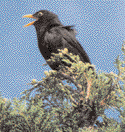| Wildlife
Newsletter for the Township of Dalkey June 2015 - Michael Ryan |
Dalkey
Raven |
It’s
twenty years since the Dalkey Tern Project began in 1995 which means
it’s also twenty years since the longest, warmest summer that
many people ever knew. If I recall correctly the spring of 1995 was
cold and wet and held little promise for the long days to come but eventually
the sun arrived and when it came it stayed. For months. The country
sizzled in the heat and with weeks of endless clear blue skies and warm
windless nights it seemed as if the whole country had moved a little
closer to the Mediterranean. There were 35 days of consecutive warmer-than-average
high temperatures from July 24th to August 27th. Kilkenny recorded the
highest temperature of the year at 30.8ºC. The east coast had less
than half the average rainfall and the odd downpour had little effect
on the browning vegetation. We spent many an evening in the car park of what was then the Dalkey Island Hotel where we had a telescope set up to monitor the terns on the rock and to show the birds to any passing member of the public who might be interested. It was lovely to hear the birds’ calls drifting across the motionless water but on many of those evenings our watch was accompanied by an acrid smell in the air. Because the silver lining of those long sunny rainless days had a dark cloud which was literally dark clouds, smoke from burning gorse and vegetation. |
|
| All
over Wicklow and the Dublin Mountains fires burnt, sometimes for weeks
on end, as the tinder dry soil itself simmered beneath the ground’s
surface. Virtually all the vegetation was burnt off the slopes of the
Sugar Loaf right down to bare rock in places and the smoke from gorse
fires on Howth hill drifted all the way across the bay. Dalkey and Killiney
hills didn’t escape with the worst fires in decades destroying
acres of habitat and incinerating vegetation, nests and insects. Fires
broke out in the banks below the Vico Rd and beside the Dart line. Fires
are a regular occurrence with gorse, whose dry foliage makes them very
incendiary but whereas normally the flames would sweep through the gorse,
heathers and other vegetation. However, the fires of 1995 simmered under
the ground’s surface sometimes flaring up and burning through
the soil and the roots of the plants. In previous fires trees might
have escaped with some burning of the trunks but the ‘95 fires
destroyed many old mature trees on Killiney hill. There had been two
Douglas Firs which had grown to tower above the rest of the trees and
may have been two of the tallest trees in the parkland until a smouldering
fire whipped up by the wind burnt through the roots of one causing it
to collapse. The skeletal remains of its mighty trunk still lie against
the hill where it fell. |
||
|
Already this year there have been very bad fires at Glencree
in Wicklow and around Muckross House in Killarney suspected, though unproven, to be caused by individuals burning off undergrowth to promote new growth for grazing sheep. The timing of the fires couldn’t have been worse for ground nesting birds. The north end of Glencree has for years been one of the few constantly reliable spots to hear a cuckoo calling in the spring and that’s because the area has had lots of breeding Meadow Pipits, the host bird whose nest cuckoos will lay their own egg in. Meadow pipits are ground nesting and very susceptible to fires so if they are in decline in the area that might have a knock on effect on the cuckoos, birds whose own numbers have been dropping for a long time. It had been a unusually dry spring this year up till the May Bank Holiday weekend’s heavy rainfall, even the pools in the lower level of Dalkey quarry were bone dry but after over 24 hours of rain by the following Monday they were full to the brim again, hopefully attracting the dragonflies that have been a very welcome addition to the area in the last few years. |
 Dalkey Blackbird Photo: M.Ryan |
|
The
Sunday of that weekend happened to be International Dawn Chorus Day
and Derek Mooney hosted a midnight to dawn series of programmes on
the radio with broadcasters at different locations around the country.
One of the locations was a live broadcast from the Presidential residence,
Áras An Uachtaráin where a group of people from Birdwatch
branches would attend and I considered myself very lucky when I found
I was had been invited to the event as a past Branch member
. An early morning walk in the grounds followed by breakfast in the
house itself was very appealing. The previous day before the event
it had rained relentlessly from dawn to dusk but the forecast had
said it would clear up before the following morning. It didn’t,
it was raining as heavy as ever at the unholy hour of 2.00am. As we
drove in through sheets of rain we listened to Mooney’s show
and the Dawn Chorus had already begun in Cork with many birds singing
there where the weather was much kinder. |